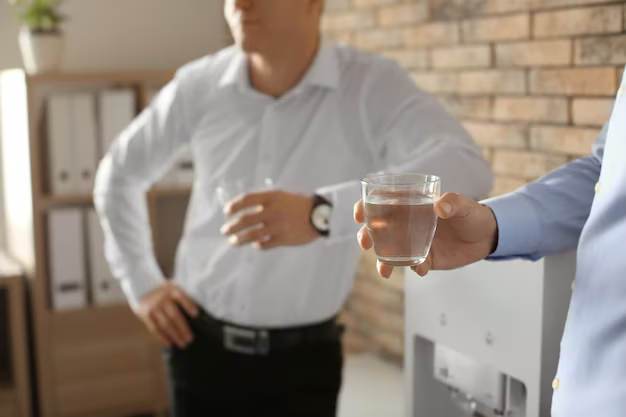Unlocking the Secrets of Refrigerator Water Filters: Are They Effective?
Picture this: You're reaching into your refrigerator for a refreshing glass of cold water, assuming it's as pure and clean as it can be. But is it really? That's where the often-overlooked refrigerator water filter comes into play. With a rise in environmental concerns and health consciousness, filtering the water that flows into your glass becomes more significant than ever. But just how effective are these refrigerator water filters in ensuring the purity of water? Let’s dive into the details to understand the scope of their effectiveness.
💡 The Purpose of Refrigerator Water Filters
Refrigerator water filters are designed to improve the quality of your drinking water by reducing common contaminants. These include:
- Chlorine and Chloramines: Often used in municipal water treatment, these chemicals can impact the taste and smell of your water.
- Sediment and Particulate Matter: Dust, sand, and other physical debris that can be present in water.
- Volatile Organic Compounds (VOCs): Such as benzene and other industrial solvents.
- Heavy Metals: Including lead, mercury, and copper, which pose health risks over prolonged exposure.
How Do They Work?
Refrigerator water filters contain activated carbon, a material renowned for its absorbent properties. As water passes through the filter, the carbon absorbs impurities and contaminants. This not only purifies the water but also improves its taste and smell.
📊 Evaluating Filter Efficiency: What to Expect
The effectiveness of a water filter largely depends on its ability to reduce or eliminate contaminants. While no filter is perfect, many can remove up to 90% of specific substances, especially those designed to target specific impurities.
Key Factors Influencing Performance
Filter Design and Quality: The construction of the filter and the quality of its materials are critical. Higher quality filters typically feature better construction, allowing them to capture more impurities.
Replacement Frequency: Over time, filters become clogged with contaminants, reducing their effectiveness. Most manufacturers recommend changing the filter every six months to maintain optimal performance.
Water Source: The composition of the tap water being used also affects filter performance. Heavily contaminated water will saturate the filter more quickly.
Flow Rate: A higher flow rate can reduce the effectiveness, as water passes through the filter material too quickly, limiting the time for contaminant absorption.
🔎 Exploring the Benefits: Beyond Clean Water
While the primary function is to provide you with cleaner water, refrigerator water filters offer several additional benefits:
- Improved Taste: By removing chlorine and sediment, filters enhance the flavor of water and ice.
- Cost Savings: By opting for filtered tap water, you can save significantly compared to buying bottled water.
- Environmental Impact: Reducing bottled water consumption decreases plastic waste, contributing to a healthier planet.
- Advanced Health Protection: With the filter reducing harmful substances, you’re less exposed to potential health risks.
🏠 General Maintenance and Care Tips
To ensure your refrigerator water filter functions effectively, proper maintenance is essential. Even though specific instructions vary, some general tips include:
Regular Replacement: Follow the manufacturer’s guidelines for filter replacement—typically every six months or according to actual usage indicated by a usage light if available.
Cleaning: Occasionally clean the housing around the filter to prevent the buildup of mold or bacteria.
Correct Installation: Ensure the filter is installed properly to prevent leaks and ensure full filtration efficiency.
Monitor Water Quality: Keep an eye out for changes in taste or smell, as these can signal that it’s time for a new filter.
🧩 Common Misunderstandings and Truths
There are a few common misconceptions surrounding refrigerator water filters. Let's address some prevalent ones:
Myth: All Filters Work the Same
Reality: Filters differ significantly in their materials, construction, and effectiveness. It’s crucial to choose one that meets your specific needs and water quality conditions.
Myth: Filters Remove All Contaminants
Reality: While they remove a substantial number of impurities, no filter is perfect. They may not be effective against all pathogens, heavy metals, or dissolved substances.
Myth: Once Installed, Filters Work Indefinitely
Reality: They require periodic replacement as they lose effectiveness when saturated with contaminants.
📋 A Quick Reference Guide to Using Your Water Filter Effectively
Here’s a concise list to ensure you’re making the most of your refrigerator water filter:
- 🔄 Regular Replacement: Change filters as recommended, typically every six months.
- 🌊 Check Flow Rate: Ensure proper flow rate for effective filtration.
- 🧼 Regular Cleaning: Maintain cleanliness around filter housing.
- 🔍 Monitor for Changes: Pay attention to water taste and smell for signs of ineffective filtration.
📈 Consumer Considerations when Choosing a Refrigerator Water Filter
If you’re considering purchasing a refrigerator water filter, there are specific factors to keep in mind:
- Compatibility: Ensure the filter is compatible with your refrigerator model.
- Certification: Look for filters that are certified by standards organizations for water quality, like NSF International, which indicates effective contaminant removal.
- Capacity: Consider filters with a capacity that matches your household's water usage.
- Price vs. Longevity: Analyze the cost-effectiveness by considering the filter’s lifespan relative to its price.
🤔 Is a Refrigerator Water Filter Worth It?
The decision to invest in a refrigerator water filter typically hinges on personal preferences and circumstances. For many, the benefits of improved water taste and reduced health risks justify the investment. For others, the reduced footprint with less reliance on bottled water is an appealing proposition.
Ultimately, understanding that while these filters significantly improve water quality, they are part of a broader water treatment strategy is crucial. Pairing a refrigerator water filter with other treatment methods is key for achieving the utmost purity.
In gaining a comprehensive understanding of your refrigerator water filter, the small investment of your time and attention offers substantial returns in health, environmental impact, and economic savings. The path to clearer, cleaner water begins not in gallons per day, but with how effectively we manage and utilize the resources at our disposal.

